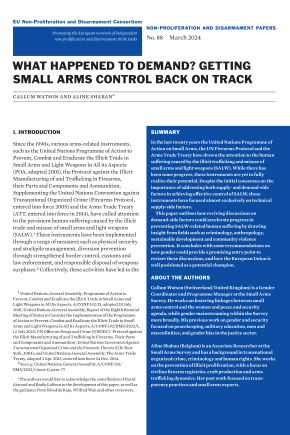What Happened To Demand? Getting Small Arms Control Back on Track
In the last twenty years the United Nations Programme of Action on Small Arms, the UN Firearms Protocol and the Arms Trade Treaty have drawn the attention to the human suffering caused by the illicit trafficking and misuse of small arms and light weapons (SALW). While there has been some progress, these instruments are yet to fully realize their potential. Despite the initial consensus on the importance of addressing both supply- and demand-side factors in achieving effective control of SALW, these instruments have focused almost exclusively on technical supply-side factors.
This paper outlines how reviving discussions on demand-side factors could accelerate progress in preventing SALW-related human suffering by drawing insight from fields such as criminology, anthropology, sustainable development and community violence prevention. It concludes with some recommendations on how gender could provide a promising entry point to restart these discussions, and how the European Union is well positioned as a potential champion.
I. Introduction
II. Overview of The Main International Approaches To Small Arms Control
III. Gender as A Conduit Towards Integrating Demand-Side Factors And Multidisciplinary Approaches To Small Arms Control
IV. Recommendations
V. Conclusion

